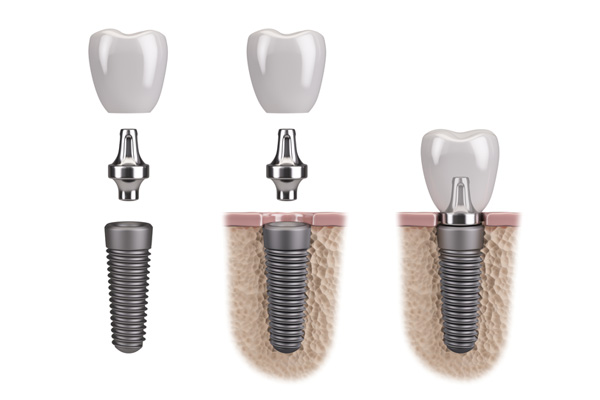 Dental implants are a permanent solution for replacing missing teeth and restoring oral function. Patients who take the time to understand the implant process enjoy successful outcomes.
Dental implants are a permanent solution for replacing missing teeth and restoring oral function. Patients who take the time to understand the implant process enjoy successful outcomes.
What are dental implants?
A dental implant is a titanium post that a dentist anchors to the jawbone to replace a missing tooth root. After the implant successfully integrates with the jawbone, the dentist fits it with an abutment that extends through the gum. The abutment provides a surface onto which the dentist mounts a prosthetic tooth.
What should dental patients know about the implant process?
A dentist can offer guidance about a patient's candidacy for implants. These five facts can determine if implants are advisable.
1. Gum health is a prerequisite
Minor gum disease can quickly progress to more severe periodontal disease that can compromise the jawbone. Placing a titanium post into a weak bone will ensure an implant's failure.
Pathology in a tooth adjacent to an implant site can also cause the procedure to fail. For example, a nearby gum infection that spreads to the bone supporting a titanium post can destabilize the prosthetic tooth. Therefore, dentists must consider the health of surrounding teeth to avoid future implant complications.
2. Periodontal disease does not rule out implants
Patients with periodontal disease should not automatically rule out getting implants. Although jawbone infections preclude implant procedures, it is possible to restore gum and jawbone health to where a dentist can proceed with treatment.
For example, dentists commonly replenish missing jawbone with natural or synthetic material to ensure sufficient support for an implant. Unfortunately, this step prolongs the implant process as the material the dentist introduces takes months to fuse with the existing jawbone. Still, a bone graft makes it possible for patients with jawbone loss to enjoy the benefits of dental implants.
3. Oral hygiene habits matter
Although prosthetic teeth are not susceptible to cavities, implants can fail when bacteria compromise the bone that supports them. Therefore, a critical part of the implant process involves a patient's commitment to rigorous oral hygiene to prevent bacteria from spreading past the gumline. Oral hygiene habits that include adequate brushing, flossing, and rinsing are essential for implants and natural teeth.
4. Implants take time
Implant treatment offers a long-lasting solution for restoring missing teeth and dental health, but the complete process may take a year. Healing for each stage requires several months; therefore, implants are not ideal for patients seeking a fast solution for missing teeth.
5. Recovery time varies
Most people tolerate dental implant procedures well, though a full recovery following each stage requires patience and depends upon various factors, including:
- The number of implants a patient receives
- How well a patient follows post-procedure instructions
- A patient’s willingness to avoid smoking and other detrimental habits
Failure to follow a dentist's post-surgical instructions may unnecessarily delay or curtail the procedure's benefits.
Conclusion
Dental implants can prevent bite misalignments, painful discomfort, chewing difficulties, and infections that affect oral and general health. Dental patients can consult with a knowledgeable dentist to discuss pertinent facts about this standard procedure.
Request an appointment or call Smiles by Design, PC at 256-660-3233 for an appointment in our Huntsville office.
Related Posts
If you are missing one or more permanent teeth, dental implants may be an option for replacing them. Placing the implants requires an operation, and not everyone is a candidate for the surgery. Your dentist can discuss the criteria you must meet to be eligible. If you do not meet the criteria now, it may…
The teeth are an essential part of the human body, which is why so many people turn to dental implants. Without enough teeth, it is harder for people to bite into and chew their food and harder to enunciate certain words when speaking. When many teeth are missing, the shape of the face will change,…
If you have one or more missing teeth or dentures that move around on you, you might want to consider dental implants. Essentially, implants are man-made devices that act as anchors for various forms of artificial teeth. They can be a great way to restore both your smile and your confidence. Here are some important…
